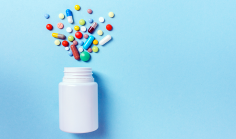Coronary Artery Disease occurs when the coronary arteries, the blood vessels that bring blood, oxygen, and nutrients to you heart, become damaged. Damage to arteries occurs due to plaque buildup inside of the arteries, which narrows and hardens them. If plaque buildup completely blocks the artery, a heart attack, also known as a myocardial infarction, occurs. Coronary artery disease is the most common type of heart disease. In 2010, it was projected to have cost the US government $108.9 billion in medical fees, medications, and lost productivity. The narrowing of the arteries that occurs in coronary artery disease can result in chest pain (angina) and shortness of breath among other symptoms.
Coronary Artery Disease

What Is Coronary Artery Disease
What Causes Coronary Artery Disease
Coronary artery disease is caused by the hardening of the arteries, which is also known as atherosclerosis. So what does this mean? Fatty deposits called plaque build up inside the arteries, the blood vessels which carry oxygen-rich blood to all of your body. These deposits can, with time, block the artery, leading to serious cardiovascular disease, and even heart attack. This build up can be the result of numerous factors, like:
- High blood pressure
- High cholesterol
- Smoking
- Diabetes
- Sedentary lifestyle
- Radiation therapy (to the chest) for cancer treatment
Risk Factors For Coronary Artery Disease
The following are risk factor for developing coronary artery disease:
- High blood pressure. High blood pressure puts added stress onto the coronary artery walls, making the development of coronary artery disease more likely.
- High cholesterol. High levels of LDL cholesterol, also known as “bad cholesterol”, contribute to atherosclerosis, the hardening of artery walls that can lead to coronary artery disease.
- Diabetes and Prediabetes. Individuals with diabetes are two to four times more likely to develop heart disease than non-diabetics.
- Smoking. Within one year of quitting smoking, the risk of heart disease falls by 50%.
- Physical inactivity. People who maintain an exercise regimen are more physically fit and are less likely to add to their CAD risk factor by smoking or eating an unhealthy diet.
- Being overweight/obese. Individuals with a BMI above the healthy range (above 25) have, on average, a 50-70% increased risk of coronary artery disease.
- Stress. Attempting to cope with stress could result in an unhealthy diet, weight gain, physical inactivity, smoking, or high blood pressure/cholesterol, all factors that increase your risk of developing coronary artery disease.
- Unhealthy diet. A poor diet can contribute to excess weight gain, high blood pressure, high cholesterol, and diabetes, all of which increase your risk of developing coronary artery disease.
- Ethnicity. Hispanics and African Americans are at a higher risk of coronary artery disease.
Diagnosing Coronary Artery Disease
If your doctor suspects you may have coronary artery disease, he may conduct the following diagnostic tests:
- Physical examination.Your doctor will ask you or a family member what symptoms you’ve been having, when they started and what you were doing when they began. Your doctor then will evaluate whether these symptoms are still present, ask about your medications and personal and family history of heart disease. Your doctor will also check your blood pressure and use a stethoscope to listen to your heart and to listen for a whooshing sound (bruit) over your neck (carotid) arteries, which may indicate atherosclerosis (a buildup of plaque in your arteries). He or she may also check for any absent or weak pulses, which can be a sign of a blocked artery.
- Blood tests. High cholesterol or blood sugar can be indicative of CAD.
- Electrocardiogram (ECG).An ECG uses small sensors (electrodes) attached to your chest and arms to record electrical signals as they travel through your heart. According to the National Heart, Blood and Lung Institute (NHLBI), the electrical signals originate in a group of cells called the sinus node or sinoatrial (SA) node. The SA node is located in the right atrium, the upper right chamber of the heart. In a normal adult heart at rest, the SA node sends an electrical signal to begin a heartbeat 60 to 100 times a minute.
- Echocardiogram. An echocardiogram uses sound waves to create detailed images of your heart and can help detect arrhythmias, structural defects, and areas of poor blood flow
- Computerized tomography (CT) scan.This scan uses a series of X-rays from a variety of angles to create a detailed cross-sectional image of your heart and chest.
- Exercise stress test. Stress tests typically involve running on a treadmill or pedaling on a stationary bike while hooked up to an ECG machine. This can help doctors understand how your heart responds to stress and what is the best long-term course of treatment for you. If a patient cannot tolerate an exercise stress test, he or she may be given a medication to challenge the heart and help assess the heart’s ability to tolerate stress.
- Angiogram (coronary catheterization). In this test, a liquid dye is injected into the arteries through a long tube known as a catheter. The dye settles on plaque buildup in the artery and reveals the buildup on an x-ray image.
Symptoms of Coronary Artery Disease
Symptoms of coronary artery disease include:
- Angina (chest pain)
- Shortness of breath
- Heart palpitations
- Abnormally fast heart rate
- Weakness
- Dizziness
- Nausea
- Sweating
Prognosis
With effective treatment, the five-year survival rate for coronary artery disease can be as high as 75%. However, if CAD is left untreated and becomes serious, survival rates can be as low as 35%.
Living With Coronary Artery Disease
Following these few simple tips can help you lessen your CAD symptoms and live a healthier life:
- Stop smoking. An estimated 20% of all deaths due to heart disease are directly linked to smoking.
- Keep your blood pressure and cholesterol under control. People with high blood pressure and cholesterol are at an elevated risk for heart disease. About 50% of ischemic strokes (caused by a blockage of the artery to the brain) are caused by high blood pressure.
- Manage your weight.About one in three American adults is obese (weighing at least 20 percent above the “suggested” weight for their height), which doubles their risk for coronary artery disease (CAD) at a given age.
- Engage in regular cardiovascular exercise. Exercise helps the heart work more efficiently, reducing blood pressure, raising HDL cholesterol, decreasing the tendency of blood to form clots, moderating stress, helping the body use insulin, and helping people maintain a healthy weight. Sedentary people who begin a regular program of exercise reduce their risk of a heart attack by 35 to 55 percent. Low-intensity activities, such as gardening or walking, if done regularly and over the long term, can decrease the risk of heart attack. Speak with your doctor about the right routine for you
- If you have diabetes, keep your blood sugar levels under control. People withdiabetes are twice as likely to have a heart attack or stroke.
- Eat a healthy diet. Opt for high fiber foods such as fruits, vegetables, and whole grains, as well as omega-3 oils such as coldwater fish and salmon), and mono- and polyunsaturated fats. But limit saturated fats and avoid trans fats, often found in fried foods, processed foods, and commercial baked goods.
- Limit salt. The American Heart Association recently reduced the amount of salt recommended for everyone to just 1,500 mg a day, which is about two-thirds of a teaspoon.
- Control stress.
- Tame alcohol intake. There’s a growing consensus that light to moderate alcohol consumption–that is, two drinks or less a day for a man, one drink for a woman (a drink is defined as 12 oz. of beer, 4 oz. of wine, or 1.5 oz. of 80-proof spirits) can help prevent heart attacks. However, drinking more than that can increase the risk of heart attack and stroke.
- Educate yourself about your condition so that you can know as much as you can about heart disease. This will help ensure you are getting the best treatment available, as well as train you to recognize any potentially harmful side effects or disease progression.
Screening
Most heart diseases and risk factors contributing to heart diseases are screened for at regular physicals. The American Heart Association stresses the importance of regular screening for cardiovascular disease. American heart association volunteer and director of William Beaumont Hospital in Royal Oak, Michigan, Barry A. Franklin, Ph. D., said on the matter, “Regular cardiovascular screening is important because it helps you detect risk factors in their earliest stages. This way, you can treat the risk factor with lifestyle changes and pharmacotherapies, if appropriate, before it ultimately leads to the development of cardiovascular disease. “Your doctor will most likely check the following:
- Blood pressure. High blood pressure is one of the most common precursors to cardiovascular disease. If it is found early, appropriate medications can help reduce the risk of cardiovascular disease due to high blood pressure.
- Body mass index (BMI). A BMI of 25 or above is considered to be overweight, and a BMI above 30 indicates obesity.
- Waist circumference. A large waist circumference is indicative of fat accumulation around the midsection, which significantly raises an individual’s risk of heart disease.
- Diet. Your doctor will most likely ask you about your diet. If your diet is high in red meats, fats, and processed foods, he or she will most likely recommend a change to include more whole grains, fatty fish, and vegetables. A diet high in red meat, fats, and processed foods can cause high cholesterol and eventually atherosclerosis (hardening of the arteries).
- Exercise. Your doctor will ask about your exercise regimen and may suggest more or less activity based on the limitations of your heart and body.
- Smoking and drug use. Your doctor will ask about smoking and drug use, which can add significantly to the risk of heart disease. If you do smoke or use drugs, your doctor will be able to help you find the right pathway to quit.
- Heart rate/heartbeat. Your doctor will conduct a physical exam, listening to your heart beat and taking your heart rate. Some doctors may wish to perform a regular electrocardiogram (ECG), which can help detect irregularities in the heart’s electrical activity. ECGs are recommended
If your doctor suspects you have a heart disease after a thorough examination, he or she may conduct several diagnostic tests to arrive at a diagnosis.
Prevention
For healthy people, the following steps have been shown to help prevent or reduce the risk factors for coronary artery disease. Keep in mind that reducing one risk factor may help reduce others:
- Quit smoking. An estimated 20% of deaths due to heart disease in the United States are linked directly to smoking.
- Reduce your blood cholesterol. For every 1 percent reduction in high blood cholesterol, there’s a 2 to 3 percent decline in the risk of heart attack.
- Avoid or control hypertension. For every one-point reduction in diastolic blood pressure, there’s a 2 to 3 percent decline in the risk of heart attack.
- Stay active. Exercise helps the heart work more efficiently, reducing blood pressure, raising HDL cholesterol, decreasing the tendency of blood to form clots, moderating stress, helping the body use insulin, and helping people maintain a healthy weight. Sedentary people who begin a regular program of exercise reduce their risk of a heart attack by 35 to 55 percent. Low-intensity activities, such as gardening or walking, if done regularly and over the long term, can decrease the risk of heart attack.
- Maintain a healthy weight. About one in three American adults is obese (weighing at least 20 percent above the “suggested” weight for their height), which doubles their risk for CAD at a given age. Obesity also increases the risk for hypertension, and high blood cholesterol.
- Avoid or control diabetes. Type 2 diabetes (non-insulin-dependent), is an important risk factor for heart disease. According to the American Heart Association, heart disease and stroke are the number one cause of death for patients with type 2 diabetes, and adults with type 2 diabetes are two to four times more likely to have heart disease than those who do not.
- Consider a drink a day. There’s a growing consensus that light to moderate alcohol consumption–that is, two drinks or less a day for a man, one drink for a woman (a drink is defined as 12 oz. of beer, 4 oz. of wine, or 1.5 oz. of 80-proof spirits) can help prevent heart attacks. However, drinking more than that can increase the risk of heart attack and stroke.
- Take low-dose aspirin. The recommended regimen–a baby aspirin (81 milligrams) daily or half a regular aspirin (160 milligrams) very other day–can lower the risk of heart attack by about one-third by reducing the ability of platelets in the blood to stick together and thus form a clot. Aspirin can have side effects and isn’t right for everyone, so consult with your doctor.
Medication And Treatment
MEDICATIONS
The following medicines are used to treat coronary artery disease:
ACE (Angiotensin-converting enzyme)inhibitors make your heart work less hard by lowering your blood pressure. Some ACE inhibitors are:
- Benazepril hydrochloride (Lotensin)
- Captopril (Capoten)
- Enalapril maleate (Vasotec)
- Fosinopril sodium (Monopril)
- Lisinopril ( Prinivil, Zestril)
- Moexpiril (Univasc)
- Quinapril hydrochloride (Accupril)
- Ramipril (Altace)
- Trandolapril (Mavik)
Side effects of ACE inhibitors include:
- Low Blood Pressure
- Headache
- Rash
- Drowsiness
- Weakness
- Cough
Angiotensin-receptor blockers (ARB)blocks angiotensin II, a substance in the body, from constricting the blood vessels and stimulating salt and water retention. They include:
- Azilsartan (Edarbi)
- Candesartan (Atacand)
- Eprosartan (Teveten)
- Irbesartan (Avapro)
- Losartan (Cozaar)
- Olmesartan (Benicar)
- Telmisartan (Myocardia)
- Valsaartan (Diovan)
Side effects of ARBs include:
- Dizziness
- Insomnia
- Vomiting/Diarrhea
- Muscle cramps
- Dehydration
- Irregular heartbeat
- Upper respiratory tract infection
Cholesterol-lowering drugs, which help to decrease cholesterol that can potentially contribute to the
- Atorvastatin (Lipitor)
- Fluvastatin (Lescol)
- Pravastatin (Pravachol)
- Rosuvastatin (Crestor)
- Simvastatin (Zocor)
- Advicor®** (lovastatin + niacin)
- Caduet®** (atorvastatin + amlodipine)
- Vytorin™** (simvastatin + ezetimibe)
- Ezetimibe (Zetia®), which removes cholesterol from the intestines.
Side effects of cholesterol-lowering drugs include:
- Muscle weakness
- Drowsiness
- Dizziness
- Vomiting
- Abdominal cramping/gas
- Nausea
- Constipation
- Flushing of the skin
- Rash
- Insomnia
- Headache
Beta-blockers, which work by lowering the heart rate, thereby reducing the stress on the heart and preventing future heart attacks. These include:
- Acebutolol (Sectral)
- Atenolol (Tenormin)
- Bisoprolol (Monocor)
- Carvedilol (Coreg)
- Labetalol (Trandate)
- Metoprolol (Lopressor, Toprol)
- Penbutolol (Levatol)
- Pindolol
- Propanolol (Inderal)
Side effects of beta-blockers include:
- Nausea
- Vomiting
- Diarrhea
- Stomach cramps
- Rash
- Blurred Vision
- Muscle cramps
- Headache
- Confusion
- Depression
*** Beta blockers can cause angina (chest pain) or heart attack if suddenly withdrawn. Never stop taking beta blockers without first talking to your doctor.
Nitroglycerin. Nitroglycerin in patches, injections, pills, and sprays can help to dilate the arteries and allow blood to flow easily, reducing the amount of stress on the heart.
Side effects of nitroglycerin include:
- Headache
- Dizziness
- Nausea
- Flushing
- Fainting
- Irregular heartbeat
Aspirin. Your doctor may recommend a regular regimen of aspirin to prevent blood clots that can lead to heart attack.
SURGERY
Surgical options may be necessary when diet, exercise, and medications are not able to provide a patient adequate relief.
Surgical options for coronary artery disease include:
Angioplasty/Stent placement. During an angioplasty, the surgeon inserts a long, thin tube into the artery through a small incision, most often in the groin. The tube is then guided to the place of blockage and a small balloon is inflated, allowing blood to flow normally within the artery. Surgeons can also choose to insert a stent, a tubular support that protects the artery from future clots.
Angioplasty and stent placement are minimally invasive procedures, and patients can typically return home the next day after being monitored overnight. Bruising and tenderness may occur at the site of the incision, though patients should be able to return to normal activity about a week after the procedure. Angioplasties are 95% successful in widening the artery. Stents are also successful once implanted. Only 1-2% of people with stents will form blood clots at the stent site.
Coronary bypass surgery. During this procedure, the surgeon bypasses the blocked artery by making a graph with a vessel from another part of the body. This is an invasive open-heart surgery that is only recommended if the patient has multiple serious blockages. Success rates for coronary bypass surgery are between 95 and 98%.
Patients will typically need 1-2 days of close monitoring in an intensive care unit, followed by a hospital stay of 3-5 days. A fully recovery varies from person to person, but typically takes 6-12 weeks. Physical activity should be incorporated gradually to prevent discomfort and complications. Side effects of the surgery typically go away within 4-6 weeks of the procedure and may include:
- Discomfort and itching of incisions
- Swelling
- Muscle pain
- Fatigue
- Mood swings
- Insomnia
- Loss of appetite
- Constipation
- Chest pain
Complementary and Alternative Treatment
The following list of supplements is offered by the University of Maryland Medical Center. Always check with your cardiologist or primary doctor before adding supplements to your regimen for treating and preventing heart failure.
SUPPLEMENTS
Many people with heart conditions take multiple medications, including blood-thinning medications, blood pressure medications, and others. The supplements below may interact with these (and other medications) and may not be right for people with certain medical conditions.
- Magnesium is particularly important for maintaining a normal heart rhythm and is often used by physicians to treat irregular heartbeat (arrhythmia). People with heart failure are often at risk for developing an arrhythmia. In addition, some diuretics (water pills) may cause your body to lose too much magnesium.
- Carnitine. Early studies show L-carnitine supplements may reduce your chances of developing heart failure after a heart attack and improve exercise capacity if you already have heart failure.
- Coenzyme Q-10. Several research studies suggest that CoQ10 supplements can help reduce swelling in the legs, enhance breathing by reducing fluid in the lungs, and increase exercise capacity in people with heart failure.
- Creatine is a naturally occurring amino acid (protein building block) found mainly in muscles. In a few studies of people with heart failure, injections of creatine (in addition to standard medical care) provided improvement in heart function and ability to exercise compared to those who received placebo.
- Vitamin B1. (Thiamine may be related to heart failure in several ways. First, low levels of thiamine can contribute to the development of heart failure. On the flip side, people with severe heart failure can lose a significant amount of weight, including muscle mass (called cachexia), and become deficient in many nutrients, including thiamine. In addition, diuretics (water pills) can cause your body to lose too much thiamine..
- Amino acids. A few small studies suggest these amino acids might be helpful for heart failure, but more research is needed:
- Arginine (needed for the body to make nitric oxide, which helps blood flow)
- Taurine (helps heart muscle contract)
STRESS REDUCTION PRACTICES
Stress reduction practices. Since stress is associated with heart disease, it’s prudent to try techniques to help reduce it. The following methods have been shown to reduce stress in some people:
- Meditation
- Yoga, Tai’ Chi, and other forms of moderate exercise such as walking
- Deep breathing
- Visualization
- Biofeedback
When To Contact A Doctor
Call your doctor if:
- You haven’t been responding to the prescribe treatment and your blood pressure remains high
- If you’re feeling nausea, fatigue, shortness of breath, lightheadedness, headache, excessive sweating, or are unable to concentrate. These symptoms may occur as the result of uncontrolled high blood pressure or side effects from the medication.
Call 911 if you are experiencing the symptoms of a HEART ATTACK which include:
- Chest pain or pressure, or a strange feeling in the chest.
- Sweating
- Shortness of breath.
- Nausea or vomiting.
- Pain, pressure, or a strange feeling in the back, neck, jaw, or upper belly, or in one or both shoulders or arms.
- Lightheadedness or sudden weakness.
- A fast or irregular heartbat
You should not hesitate to call 911 if you are experiencing any of these symptoms that come on suddenly. You could be having a STROKE.
- Numbness, tingling, weakness, or loss of movement in your face, arm, or leg, especially on only one side of your body.
- Vision changes.
- Trouble speaking.
- Confusion or trouble understanding simple statements.
- Problems with walking or balance.
- Severe headache that is different from past headaches.
Questions For A Doctor
You will probably have different questions to ask your doctor depending on your heart condition. Be open about all your concerns. If you’re having difficulty focusing, bring along a friend or family member. Below you’ll find general questions you might want to ask your doctor about heart disease as suggested by the American Heart Association.
QUESTIONS ABOUT MEDICATION
- What is the name of the medicine?
- Is this the brand or generic name?
- What is the medicine supposed to do?
- What happens if I miss a dose of my medicine?
- How will I know that my medication is working?
- What are the risks of taking this medication?
- What are the risks of NOT taking this medication?
QUESTIONS ABOUT DIET
- What kinds of foods should I eat?
- What kinds of foods should I avoid?
- Should I restrict my calories or fat intake to a certain level?
- What are some cooking tips that I should follow?
- What do I need to know about eating out?
- Do I need to see a nutritionist or dietitian?
- Are there any groups in the community that can help me with my nutrition goals?
- How can I control the portions? How much salt may I eat?
QUESTIONS ABOUT EXERCISE
- Can I exercise?
- Can I play sports?
- What are the best types of activities for me?
- How much activity do I need?
- Can I have sex?












